Six women with disabilities recount their experiences navigating the world during the pandemic
Originally published on Global Voices
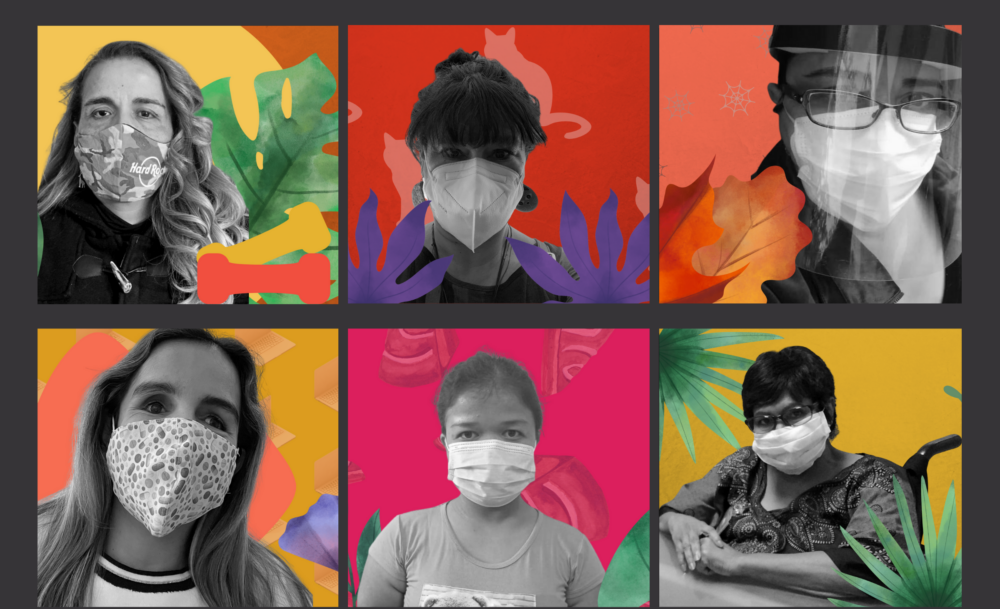
Photos from participant archives with illustration by Giovana Fleck and layout design by Natalie Van Hoozer.
This story is part of a series. See the first story here.
Six Latin American women with disabilities took part in facilitated conversations to talk about how the global health crisis has impacted their lives on a personal level. They connected virtually from the Dominican Republic, Mexico, Bolivia, Spain, and the United States.
Explore the following map to learn more about the women.
ALT TEXT: The preview image of the StoryMap digital tool features six photos of women wearing masks, as well as a map of the world marking six different locations in Latin America, Spain and the United States. A transcript of the text on the map and alternative text describing the photos can be accessed here.
From moving about in the streets to navigating vaccination sites, they share what it's been like to set foot outside during the pandemic.
The streets
For women who are blind, navigating the world is not the same as it was before the pandemic, from touching objects and finding their way, to obtaining critical information about the coronavirus.
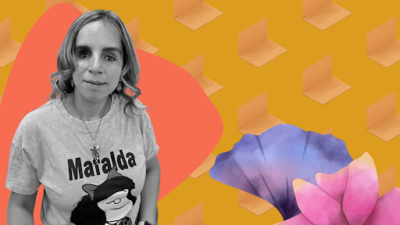
Karina Ramírez works evaluating technology for the visually impaired. Originally from Costa Rica, she now lives in Spain. Photo from personal archives with illustration by Giovana Fleck.
Finding information online is often the first obstacle when trying to leave the house during the pandemic. “There was a website where you could find out the hours you were allowed to go shopping. But the information was provided as an image on a map without any alternative text. For me, there wasn’t any information I could access, I was both literally and figuratively blind,” says Karina Ramírez, who is blind and uses a cane to get around. According to AbilityNet, over 90 percent of websites are not accessible for people who are visually impaired.
Once outside, maintaining social distancing led to a slew of challenges. “I had a lot of questions and fears about how it would work when I needed to go outside, what it would be like to walk down the street, knowing that we blind people depend on guiding ourselves with sense of touch. Those types of situations were difficult, because of the fear of not knowing if you were exposing yourself [to COVID] and weren’t able to do anything about it,” said Karina, who is originally from Costa Rica and now lives in Madrid, Spain.
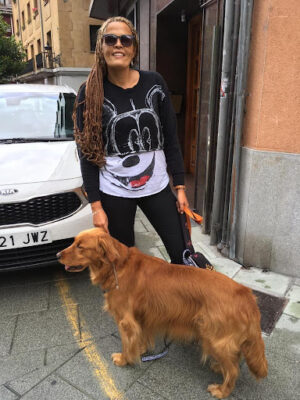
Lida Margarita Carriazo with her guide dog Raquel. Photo from personal archives.
In northern Spain, in Sama, Asturias, Lida Margarita Carriazo felt similarly when she left home to do her shopping. She is from Colombia, where she worked as a teacher and owned a kindergarten. Her vision loss eventually progressed to total blindness and her guide dog Raquel is now her companion to navigate the world.
During the pandemic, Lida and another blind person went to the supermarket to see what the experience would be like, while a video journalist filmed them. Lida explained how the other customers treated them with indifference. “Do you think someone said to us, ‘I’ll help you,’ or ‘You should move up?’ No, no they didn’t!” she said.
Work
In Santa Cruz, Bolivia, Margareth Durán Vaca is a member of the Asociación de Personas de Talla Baja (The Association for People of Short Stature, in English) and the mother of three children. She reflects on what isolation during the pandemic was like for her: “It was very difficult for us to get money, to go to the market. I was pregnant, and I remember I had to walk a long way to pick up my disability pension because cars weren't allowed.”
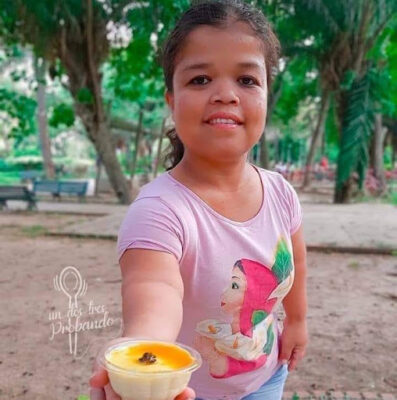
Margareth Durán Vaca showcases the passion fruit dessert she sells at her family business. Photo from personal archives.
To make a living, Margareth and her family started selling homemade desserts in her neighborhood, even though it meant risking possible exposure to COVID. “We started doing it out of necessity. Thanks to our desserts business, we have managed to get by during the pandemic,” said Margareth, who ended up contracting COVID-19, but has since recovered.
However, leaving the house for work hasn’t been an option for everyone during the pandemic. In Mexico City, Zaría Abreu Flores, a writer, playwright, and poet, is still confined to her house, even though isolation restrictions have been lifted. She is coping with long COVID-19 as an acquired disability on top of autism, epilepsy, and a compromised immune system.
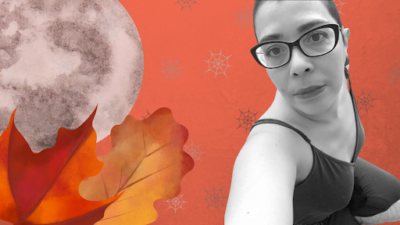
Since the start of the pandemic, Zaría Abreu Flores rarely leaves her Mexico City home. Photo from personal archives with illustration by Giovana Fleck.
“I lost my job. Financially I am no longer an independent person. Long COVID has progressively disabled me. I need to use oxygen some days, and some days I don’t. I am in mandatory confinement, a prison. However, I have a lot of tools that I can draw on to manage my situation. Prior to the pandemic, there was a time when I was in a two-year depression, I couldn't get out of bed or leave the house. Going through that experience is really helping me cope now,” she said.
The Vaccination Site
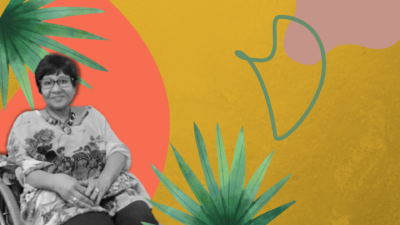
Cristina Francisco advocates for the rights of women with disabilities in the Dominican Republic, where she is from. Photo from personal archives with illustration by Giovana Fleck.
Cristina Francisco lives in Santo Domingo, Dominican Republic. She is the founder of the nonprofit organization called The Circle of Women with Disabilities (CIMUDIS, in Spanish). She is paralyzed from the waist down and uses a wheelchair.
At the beginning of the pandemic, the Dominican Republic’s government offered assistance to cope with the pandemic's effects, which required beneficiaries to be able to transport themselves to the office and wait in line. Cristina asked herself, ” ‘How can I get there? There isn’t a way!’ My friends with disabilities and I were uncertain and fearful [about the situation] because the Dominican Republic’s government policies did not consider protocols that included us.”
Cristina, along with other human rights advocates, pushed the government for improved access to public care: “As one voice, we all started to protest, attracting attention from the press, and things started to get better. When the vaccination process started, government organizations were ready, saying, ‘If you have a disability, we will give you preference’,” she said.
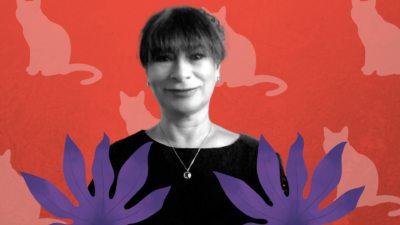
Pamela Molina was part of the group of experts who wrote the United Nations Convention on the Rights of Persons with Disabilities. Born in Chile, Pamela currently lives in the United States. Photo from personal archives with illustration by Giovana Fleck.
In Washington, D.C., Pamela Molina is the executive director of the World Federation of the Deaf. Originally from Chile, she has gradually lost her hearing. When she went for her second COVID-19 vaccine, there was not a sign language interpreter present to answer her questions, even though she requested interpretation services ahead of time. “The vaccination site staff told me that I didn’t need an interpreter in order to get my vaccine, but I told them that I wasn’t comfortable getting vaccinated until an interpreter was there. They ended up connecting me with an interpreter via a video call. Fluid communication is important to me. Deaf people are doubly stressed [by communication], and that anxiety is even greater for deaf women,” Pamela shared with her conversation partner, accompanied by sign language interpreter Lourdes Cruz.

Lida Margarita Carriazo does a weight workout at the gym with her guide dog Raquel alongside her. Photo from personal archives.
However, not all challenges related to going out into the world have to do with vaccines. Those who need to continue medical treatments have also faced obstacles, including Karina in Madrid, who is blind. She was diagnosed with a cancerous tumor in her arm right before the global health crisis, which required her to make regular visits to the hospital for radiation therapy at the beginning of the pandemic. “I felt like I was walking into the lion's den. I had to go in and out of the hospital by myself. After 23 sessions, I knew the way and everyone who worked there would help me. It was a difficult time, made even harder because of my disability,” Karina said.
Managing mental health has also been part of the ripple effects of the pandemic. To cope with pandemic fatigue, Lida looks to exercise: “In the gym, my personal trainer would say to me, ‘Look, I can’t touch you or guide you [because of COVID].’ So I brought my cane from home, and he would hold one end and I would hold the other end. Truth be told, I found the whole thing a bit humiliating, but I made a decision to not sacrifice going to the gym. I laugh now, but being at the gym felt like a scary thing to do. It still does,” she said.
The future
Learning to adapt, as Karina, Lida, Margareth, Zaría, Cristina, and Pamela have, will be a needed skill to face the future pandemics predicted by the World Health Organization. Will spaces continue to be disabling, or will they adapt to people?
From her forced isolation, Zaría reflected: “I believe that the pandemic has changed people’s mindset about what accessibility means. Many of us need to go out without the fear and risk of being infected. One of the most infuriating things I’ve heard people say is that there’s nothing to worry about because only the elderly and people with chronic conditions die [from COVID]. Only us! Changing that mindset isn’t just up to government organizations, but to all of us.”
“Persisting in the Pandemic: Conversations between Latinas with disabilities” was produced with support from the International Center for Journalists and the Hearst Foundations as part of the ICFJ-Hearst Foundations Global Health Crisis Reporting Grant. The grant also provided mentorship and editorial support from Mexican journalist Priscila Hernández Flores, who specializes in reporting on human rights with an emphasis on diversity and disability. The women who participated in this project interviewed each other and guided their conversations. This is the second of a four-article series. The interview quotes included in this article have been edited for clarity and brevity. The first article of the series provides context about the rights of women with disabilities in Latin America during the pandemic.
Post a Comment